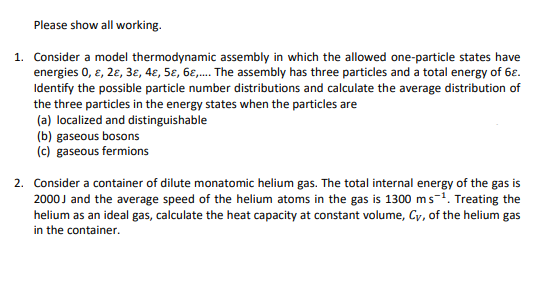Please show all working. Consider a model thermodynamic assembly in which the allowed one-particle states have energies 0, e, 2ɛ, 3ɛ, 4ɛ, 5ɛ, 6ɛ,.. The assembly has three particles and a total energy of 6e. Identify the possible particle number distributions and calculate the average distribution of the three particles in the energy states when the particles are (a) localized and distinguishable
Please show all working. Consider a model thermodynamic assembly in which the allowed one-particle states have energies 0, e, 2ɛ, 3ɛ, 4ɛ, 5ɛ, 6ɛ,.. The assembly has three particles and a total energy of 6e. Identify the possible particle number distributions and calculate the average distribution of the three particles in the energy states when the particles are (a) localized and distinguishable
Related questions
Question
1) a)

Transcribed Image Text:Please show all working.
1. Consider a model thermodynamic assembly in which the allowed one-particle states have
energies 0, e, 2ɛ, 3ɛ, 4ɛ, 5ɛ, 6E,. The assembly has three particles and a total energy of 6ɛ.
Identify the possible particle number distributions and calculate the average distribution of
the three particles in the energy states when the particles are
(a) localized and distinguishable
(b) gaseous bosons
(c) gaseous fermions
2. Consider a container of dilute monatomic helium gas. The total internal energy of the gas is
2000J and the average speed of the helium atoms in the gas is 1300 ms-1. Treating the
helium as an ideal gas, calculate the heat capacity at constant volume, Cy, of the helium gas
in the container.
Expert Solution
This question has been solved!
Explore an expertly crafted, step-by-step solution for a thorough understanding of key concepts.
Step by step
Solved in 2 steps
